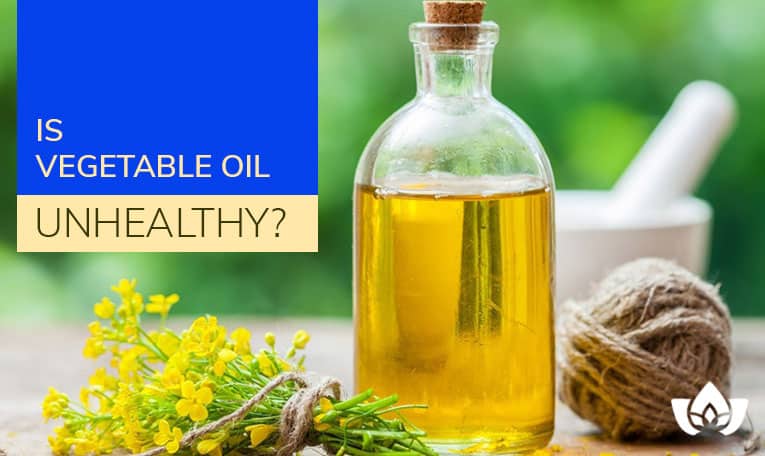
Of course it’s healthy, right?
After all, it has vegetable in the name, and vegetables are good for you.
It’s not quite that simple.
Let’s take a deeper dive into the world of vegetable oils today.
Even though many of the oils you’ll see at your local supermarket have packaging claiming they are “heart healthy,” it may only be because polyunsaturated fats have a reduced risk of cardiovascular problems compared to saturated fats.
Because they can be hard to navigate without a medical degree, I’ve put together some information for you on which vegetable oils are unhealthy.
Consider booking an online naturopathic consultation if you want more information or are concerned about your oil intake.
What Are Vegetable Oils?
Simply put, an oil that’s extracted from a plant is considered a vegetable oil.
The most common vegetable oils nowadays are coconut oil, olive oil, sunflower oil, corn oil, and soybean oil.
The oil is extracted by pressing the plants or their seeds, and this is the preferable method; however, the oil can also be extracted using a chemical solvent, which is less desirable.
After the extraction, they are usually purified and refined, though sometimes they can be chemically altered in the process, too.
Refined vegetable oils were only available starting in the twentieth century, when the technology finally was able to catch up to a burgeoning population with new culinary needs.
What Are Omega-3 And Omega-6 Fatty Acids?
You’ve likely seen them advertised as a good feature on your eggs or other groceries: the omega-6 and omega-3 fatty acids.
Do you know what they do and how they affect your health?
These fatty acids are called ‘polyunsaturated fats’ because they have many double-bonds.
Because your body doesn’t produce them naturally, the only way you can get them in your diet is by eating them.
You can become deficient and fall sick if you don’t consume enough, which is why they’re considered “essential”.
These fatty acids have an active role in your bodily functions, including inflammation and blood clotting.
They are unlike other fats in this way; they aren’t simply used for energy.

What Is The Ideal Ratio Of Omega-3 To Omega-6?
Even amongst these essential fatty acids, they have different purposes, and they exist symbiotically in your body.
Did you know that there is an ideal ratio for omega-6 and omega-3?
Omega-6 fatty acids tend to be inflammatory, while omega-3 are anti-inflammatory.
Inflammation is a necessary function for your body, but there can also be too much of a good thing – chronic or excessive inflammation can lead to disease.
Scientists have been paying attention to the high levels of inflammation in our bodies, and suspect that an unbalanced ratio could be part of the problem – we’re eating far too much omega-6dense foods and not enough omega-3.
To give you some idea, our current diets deliver omega-6 and -3 at a ratio of roughly 20:1, despite the fact that the human body developed over centuries with the ratio closer to 1:1 – a huge shift.
What Happens When Your Omega-6 Levels Are Too High?
Having high omega-6 levels without the mitigating factors of the omega-3 could lead to chronic inflammation in your body.
This can have a direct impact on not just your risk of obesity, but can also make you more prone to heart disease, arthritis, cancer, and inflammatory bowel disease.
What Oils Are High In Omega-6?
To reduce the chance of chronic inflammation, consider staying away from oils such as peanut, soybean, sunflower, sesame, and corn oils.
Let’s quickly go over the different types of fats.
Remember that omega-6 and -3 oils are polyunsaturated fats, which means they have two or more double bonds.
Monounsaturated fats have one double bond, while saturated fats have no double bonds.
Polyunsaturated fats are prone to oxidation, which causes them to deteriorate.
These fats are stored in your cell membranes, so if they oxidize, then your cell membranes could be damaged in the oxidation process.
As the fats degrade into harmful compounds, these can affect your physiology.
What Are Some Healthy Alternatives?
The best idea, truly, is to use a variety of different fats in your cooking, but if you’re looking for options that are lower in omega-6, then choose olive oil, coconut oil, or good old-fashioned butter.
If you’re really in love with your omega-6-laden fats, then consider adding more omega-3 fats to your diet through other means.
Some examples of foods high in omega-3s are: grass-fed lean meats, seafood, eggs high in omega-3, cod liver oil, and plant-based sources such as flax and chia.
It’s also important to keep in mind what the smoke point of your oil is.
This is the temperature at which the oil you’re using starts to break down. This tends to make it unhealthy.
It’s called a smoke point because oil tends to start smoking at this point, but it doesn’t necessarily do so depending on how you’re cooking it.
Olive oil and sesame oil, for example, have a smoke point of about 350 degrees, which makes them ideal for salads and lower temperature cooking, but are harmful at higher temperatures.
Avocado oil, on the other hand, has a smoke point of 520 degrees, so cook away.
What About The Stuff Labeled “Vegetable Oil”?
Vegetable oil is used as a generic label for a blend of different types of vegetable-based oils.
In general, it’s the least expensive option, and has a fairly high smoke point and neutral flavour, which makes it popular.
However, the problem with vegetable oil is that you don’t know what’s in it.
Generally, vegetable oil includes canola, sunflower, safflower, and corn oils.
The rate of different types of fats in each of these varies, so it’s a lot more difficult to control for what you’re eating.
As a result, most healthcare providers recommend avoiding it.
Book An Appointment With The Mindful Healing Clinic
Has this dive into vegetable oils and the balance between omega-3 and -6 fatty acids piqued your interest?
Are you interested in better understanding how this applies to your health and the health of your family?
If so, book a consultation today.
It’s simple to book an online appointment with me, Dr. Maria Cavallazzi, so we can review any oil use you may be concerned about, or whether the oils you use could be having an effect on your health.
It’s never too late to take action – book your appointment now.
Until next time,
Dr. Maria Cavallazzi, N.D
Mindful Healing Naturopathic Clinic
Mississauga, ON L5M 1L7
(905) 819-8200
► https://g.page/MindfulClinicNaturopathic
Dr. Maria Cavallazzi is a medical doctor from Colombia where she practiced as a family physician for 8 years until she moved to Canada 16 years ago and became a naturopathic doctor in Mississauga.


